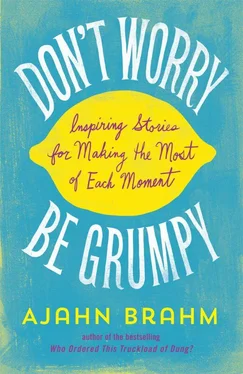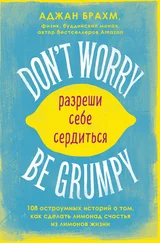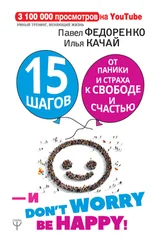Parents should lower their expectations of their children. Only half of all children can come in the top 50 percent at school! And children should lower their expectations of their parents too. None of us has finished growing yet.
In fact, I often advise Buddhist parents that if their children come in the top 10 percent or bottom 10 percent at school or college, then they are not good Buddhists. This is because good Buddhists should follow the core teaching of the Middle Way. If your kid comes in the middle somewhere, then they are good Buddhists!
Boys want good-looking girlfriends. Girls want rich husbands. They should both lower their expectations for a happier life. When a boy marries a beautiful girl, he will be jealous for the rest of his life, worried that she may be seduced by another man. But if he marries an ugly girl, he has nothing to worry about. If a girl marries a rich guy, she will always be suspicious that he may be having an affair with another woman. But if she marries a poor guy, then he will never be able to afford a mistress, so her marriage is secure, and she can relax. This is another example where lowering expectations makes life easier and more fun.
Three of My Most Memorable Mistakes
I don’t expect to be perfect. In fact, I like making mistakes. Because when I tell my friends about the stupid things that I have done, it makes them laugh. My stupidity increases the happiness in the world.
1. I had just completed teaching a nine-day meditation retreat in Penang, and my hosts were seeing me off at the airport. They had bought me a yummy coffee drink before I was to board the aircraft. It was strong, thick, and sweetened with ice cream.
I went to suck the delicious nectar through the straw, but nothing came through. I sucked harder. Still nothing. The straw must be blocked. So I sucked really hard. That was when I noticed some of my hosts giggling while the others were holding their hands over their mouths trying, out of politeness, not to laugh. So I removed the straw from the glass, only to realize that it was a plastic spoon.
Where I came from, spoons were metal with wide flat handles, not thin, round, and plastic as in modern coffee shops. And the coffee was too thick to see what was on the end of the plastic thing. Nevertheless, I burst out laughing, allowing my hosts to join in. I had made many people happy.
2. My early training as a Buddhist monk occurred in northeast Thailand under the renowned meditation teacher Ajahn Chah. When I arrived in Thailand, I could speak no Thai, so I had to learn “on the job.”
One day I needed some soap. The routine was to approach the teacher and simply ask, in Thai of course. The Thai word for soap is saboo . I said “sapo,” which happens to mean “pineapple.”
Ajahn Chah asked what I wanted a pineapple for. I answered “to wash with.” Ajahn Chah almost fell off his chair laughing.
He had merriment for days telling his Thai visitors, “Have you seen these Westerners? They wash with pineapples. They’re such an advanced culture.”
My attempts to speak Thai gave many such happy moments to my teacher.
3. On another occasion, I was asked to perform the funeral ceremony for the parent of a Sri Lankan member of my Buddhist temple. I stood at the lectern in the funeral home to welcome all the mourners to the solemn Buddhist ceremony. I began by saying, “We are here today to remember with respect my friend’s mother, who passed away recently.”
Sri Lankan names are so long and difficult for Westerners to pronounce that I called her “my friend’s mother.”
It was then that an old lady sitting in the front stood up, interrupted my welcoming speech, and said indignantly, “It is not me who has died; it’s my husband!”
Everyone laughed. I think even the coffin shook! The service then became a true celebration of the life of the deceased, full of happy memories to the very last.
I received a call late in the afternoon that a Buddhist family was on its way to see me after finishing interviews with the police. That morning, they had woken up to a parent’s worst nightmare. They found their seventeen-year-old son hanging on the end of a rope.
Often suicides among the young are totally unpredictable. The boy had many friends and showed no signs of depression. He appeared happy at school, where he was about to take the university entrance exams. He was expected to perform very well. There was not the slightest forewarning of what he was about to do.
The parents were struggling with guilt, asking themselves repeatedly what they could have done, or said, to prevent this. Fortunately, Buddhism doesn’t exaggerate personal mistakes and nurture them into the devouring monster that is guilt. I could easily reassure them that they deserved no blame. Such suicides happen to the most caring and diligent of parents. They accepted this.
Next, they expressed a level of concern that I can only describe as “terrified” over what would happen to their son after such a death. Being Buddhists, they accepted reincarnation. They had also heard that those who commit suicide are reborn in hell.
It was trauma enough to witness the suicide of their son, but imagining him in such terrible pain afterward was adding torment upon torture. Whether or not we believe in life after death, we all like to hear that our recently deceased loved ones “have gone on to a happier place.” Imagine what it must be like to believe that they are now in a far worse place, an indescribably worse place.
Knowing that their son would have been taking his university entrance exams soon, I asked the parents how many subjects he was to take and how many papers in each subject. The parents were confused about why I was asking such a question at this time. Out of respect for me, they replied that he was to take four subjects with two papers in each. Then I asked how many questions, on average, in each paper. They replied that there were about eight questions per paper.
“That makes a total of sixty-four questions to get into an Australian university,” I said. “What would happen if a student answers sixty-three of those questions perfectly correct but makes a total mess of the very last question? Would that student get accepted into university?”
The parents smiled as they said, “Yes, of course.” They had understood the metaphor.
Their son does not get denied a happy rebirth solely because of his suicide, no more than a student is denied a place at university solely because he gave a wrong answer to the last question on the exam. Their son was a very kind, good boy. He had given so many excellent answers to the tests of life that he well deserved a happy rebirth.
The Benefits of Being Blown Up
I travel in planes a lot — so frequently that many of my friends worry for my safety. Planes are a prime target for terrorists, and the more I step on a plane, the more likely a suicide bomber will blow me up.
In order to reassure my friends, I recount the three benefits of dying in an aircraft explosion at thirty thousand feet:
1. Instant cremation . If you have ever had to organize the funeral of a close relation, you will know how much work it is. You have to organize the funeral company, select the coffin, inform all the friends and relatives, take time off work for the ceremony, and, usually, feed your guests afterward. But if your grandma, for example, dies in a bomb explosion in mid flight, everything is taken care of. No need for funeral directors, coffins, or taking time off work. Even the scattering of the ashes is taken care of. This is the first benefit: an instant and worry-free cremation.
2. Cost-effective outcome . Funeral services, as they say, cost an arm and a leg (and the rest of the body for the one in the box). The relatives organizing the rites, understandably, cannot bring themselves to arrange a cut-price, special-offer-for-this-week-only funeral for dear old grandma. But if grandma died in an aircraft terrorist attack, not only would there be no funeral expenses, but the relations would get a substantial insurance payout from the airline company as well. At the end of the day, they would come out ahead from granny’s demise.
Читать дальше










